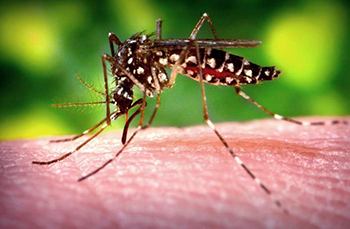ZIKA: KILLER OF THE UNBORN


BY CELESTE SPRINGER – The Florida Department of Health has reported the first local transmission of the Zika virus seen within the state all year. According to the report released on October 12th, a Manatee County couple traveled to Cuba where it is believed that one was bitten by a mosquito infected with Zika. After returning home, officials suspect the infected individual was bitten by a Floridian mosquito who later transmitted the virus to the other partner.
The CDC reports that 5,534 cases of the Zika virus have been documented this year, with majority of instances being the result of individuals traveling to affected areas abroad and returning home.
The Zika virus is often mild, with many of those infected showing flu-like symptoms paired with rashes or joint pain. It is known to be spread through the bite of an infected Aedes aegypti, a species of mosquito common in South American regions, but can also be transmitted sexually or through blood transfusions. Though not life-threatening to the average adult, cases of Zika in women who are pregnant are devastating.
The virus is known to be communicable from mother to fetus. Zika passes through the placenta and infects the unborn child, killing off brain cells after using them as a host to spread.. A mother and child are most at risk when infected during the first trimester, however the virus can still reap significant damage even if a mother is bitten as she nears closer to full term.
Children infected with the Zika virus in utero are commonly diagnosed with microcephaly, a condition where the child’s head is disproportionately small. The diagnosis is commonly an indicator of improper brain development and can result in the child having hearing or vision problems, developmental delays, as well as epilepsy. Though the diagnoses vary in severity, children with microcephaly will likely need to rely on the use of speech and physical therapy for the rest of their lives. In the most severe of cases, children will die in utero.
The Zika virus became well known in 2015 as it swept through South America, leaving the World Health Organization to declare it an epidemic just one year later.
The problem has not been confined to South America, however, as over 1,600 pregnant women in the U.S. have been reported as carriers so far this year. Of the 1,300 of women that had laboratory evidence to support that they were infected, 77 lost their child during pregnancy and 51 babies born had birth defects.
The CDC and other health organizations are encouraging women who are pregnant to take steps to protect themselves and their babies from Zika. Women are urged to avoid travel to heavily infected areas such as Brazil, Cuba, Mexico, and the Dominican Republic. Women should also be weary of having sex with men who may be infected and are recommended to use a condom when engaging with someone who may have recently traveled to areas where the Zika virus is heavily present.
Currently, there is no approved vaccine for the prevention of the Zika virus, though researchers in the medical field are working to change that. A recent study published by the journal, Science Translational Medicine, found that scientists were able to prevent the spread of the virus in four macaque monkeys through the use of a mixture of several Zika antibodies. Similarly, researchers at the University of Washington in St. Louis and at Imperial College London have found that antibodies from mice infected with the Dengue virus can be used to protect other mice from becoming infected with Zika. Dengue virus, or Dengue fever, is similar to Zika in that is communicable through infected mosquitoes. Scientists believe they can translate this research so it may be applicable in larger mammals, such as monkeys. Researchers hope that the findings will help develop a vaccine that can prevent pregnant women from developing the virus, though they believe the treatment will not be available for years to come
.
